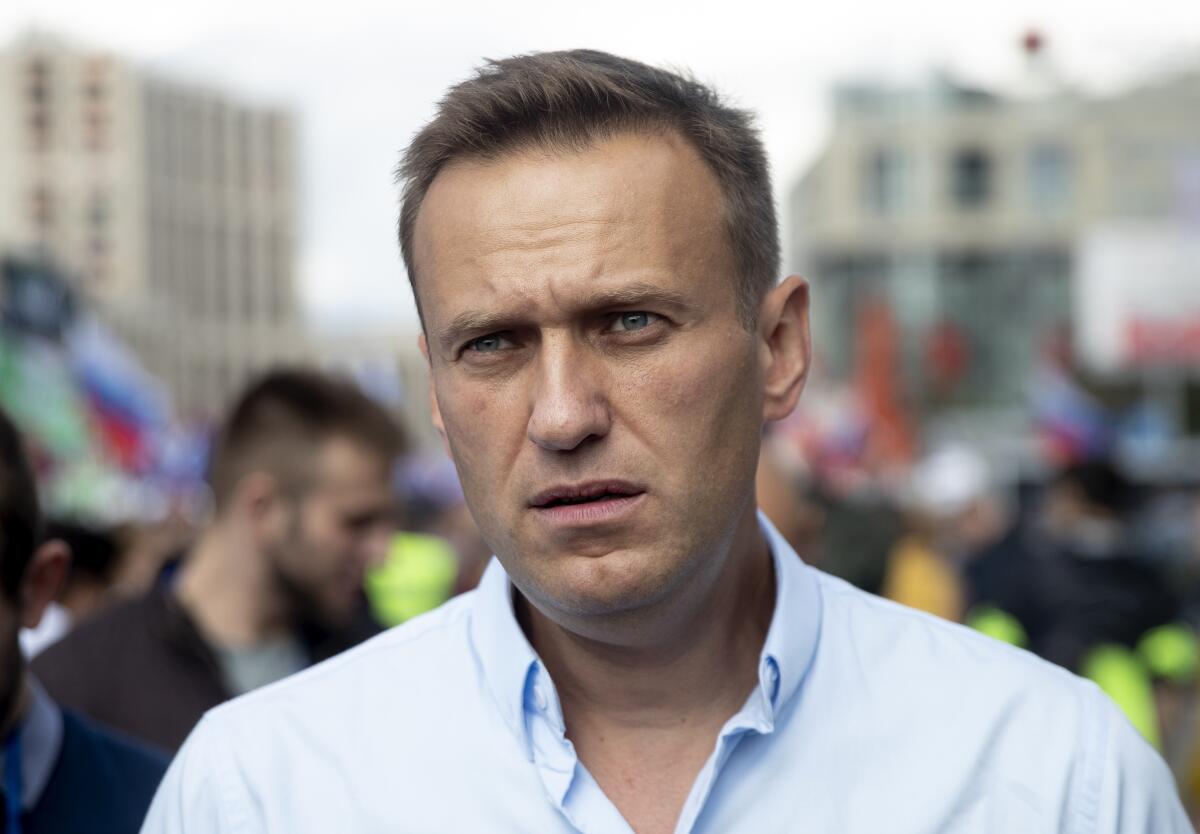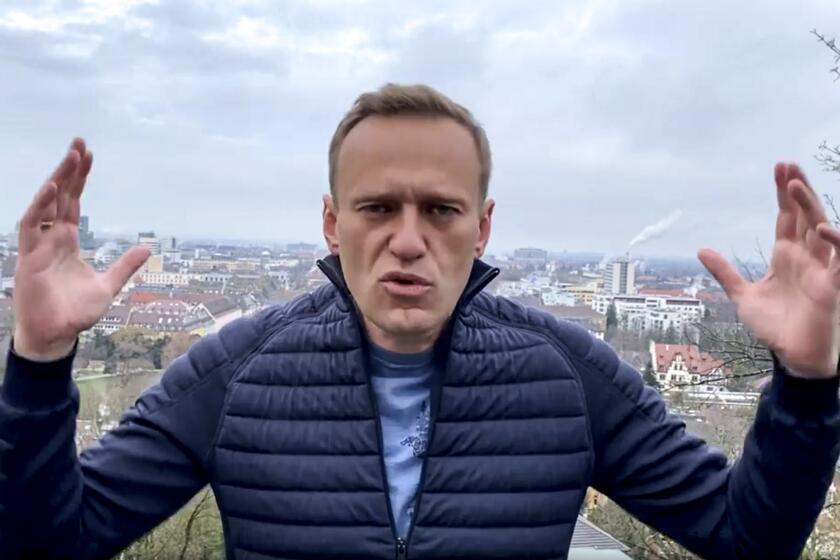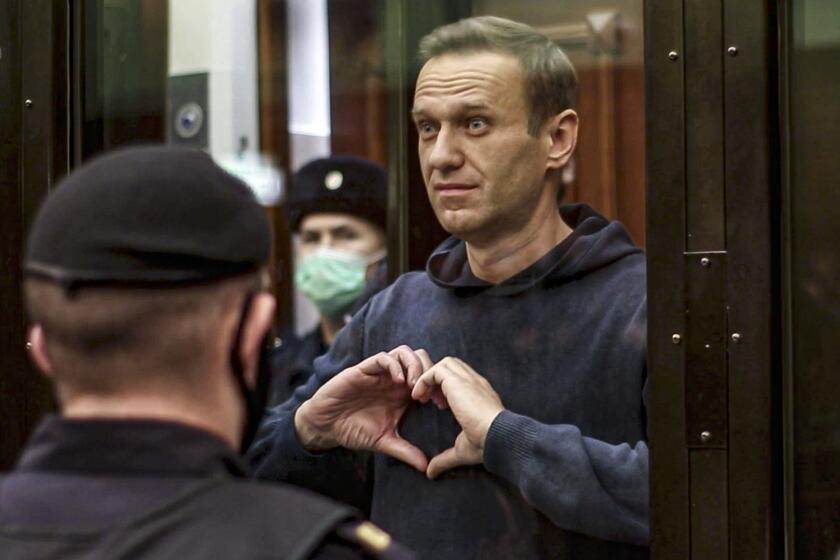Hunger-striking Navalny to be moved to hospital in another penal colony, officials say

- Share via
MOSCOW — Russian opposition leader Alexei Navalny, who is in the third week of a hunger strike, will be admitted to a hospital in another prison, the Russian state penitentiary service said Monday, after the politician’s doctor said he could be near death.
The prison service, FSIN, also said that Navalny had agreed to take vitamin therapy, but an ally of the 44-year-old Kremlin critic cast doubt on that and the hospital transfer, saying his lawyers should confirm both.
The state prison service, FSIN, said in a statement that Navalny would be transferred to a hospital for convicts in another penal colony in Vladimir, a city 110 miles east of Moscow. According to the statement, Navalny’s condition is deemed “satisfactory.”
Navalny’s physician, Dr. Yaroslav Ashikhmin, said Saturday that test results he received from Navalny’s family show him with sharply elevated levels of potassium, which can bring on cardiac arrest, and heightened creatinine levels that indicate impaired kidneys. “Our patient could die at any moment,” he said in a Facebook post.
Navalny went on a hunger strike to protest the refusal to let his doctors visit when he began experiencing severe back pain and a loss of feeling in his legs. Russia’s state penitentiary service has said that Navalny was receiving all the medical help he needs.
In response to the alarming news about Navalny’s health this weekend, his allies have called for a nationwide rally Wednesday, the same day President Vladimir Putin is scheduled to deliver his annual state of the nation address.
If Russia is ‘painfully killing’ jailed opposition figure Navalny, what’s the Kremlin’s long game?
Several Navalny allies dismissed the move announced Monday by the prison service as insufficient. Navalny’s top strategist, Leonid Volkov, said no one should assume the transfer to a hospital was happening until the opposition leader’s lawyers confirm it. The lawyers were en route to the prison where the hospital was, Volkov said.
“Until the lawyers locate him, we won’t know where he is and what is up with him,” Volkov wrote in a Facebook post.
Ivan Zhdanov, the head of Navalny’s Foundation for Fighting Corruption, tweeted that the move would merely take Navalny to another “tormenting colony, just with a big in-patient facility, where gravely ill are being transferred.”
Dr. Anastasia Vasilyeva, head of the Navalny-backed Alliance of Doctors union and also the politician’s personal physician, noted that it was “not a hospital where a diagnosis can be determined and treatment [can be] prescribed for his ailments,” but rather “a prison where tuberculosis is being treated.”
The sentencing of Putin critic Alexei Navalny doesn’t solve the Russian president’s problems.
She again called for the prison to let her and other physicians see him.
Navalny, Putin’s fiercest opponent, was arrested in January upon his return from Germany, where he had spent five months recovering from a poisoning he blames on the Kremlin — accusations Russian officials have rejected. Navalny’s arrest triggered a massive wave of protests all across Russia, the biggest show of defiance in recent years.
Soon after the arrest, a court ordered Navalny to serve two and a half years in prison on a 2014 embezzlement conviction that he says was fabricated and that the European Court of Human Rights has deemed “arbitrary and manifestly unreasonable.” Last month, Navalny was transferred to a penal colony east of Moscow notorious for its harsh conditions.
Navalny has complained about being sleep-deprived because guards conduct hourly checks on him at night, and said he has developed severe back pain and numbness in his legs within weeks of being transferred to the colony. His demands for a visit from an independent physician were rebuffed by prison officials, and he went on a hunger strike March 31.
Start your day right
Sign up for Essential California for the L.A. Times biggest news, features and recommendations in your inbox six days a week.
You may occasionally receive promotional content from the Los Angeles Times.
In a message from prison Friday, Navalny said prison officials threatened to force-feed him “imminently,” using “straitjacket and other pleasures.”
Navalny’s arrest and subsequent health problems have brought repeated criticism from the West.
“We call on the Russian authorities to grant him immediate access to medical professionals he trusts,” the European Union’s top diplomat, Josep Borrell, said Sunday. “The EU will continue to call for his immediate and unconditional release as we consider his sentencing politically motivated and running counter to Russia’s international human rights obligations.”
National security advisor Jake Sullivan said on CNN that the United States is concerned about Navalny’s health.
“We have communicated to the Russian government that what happens to Mr. Navalny is their responsibility, and they will be held accountable by the international community,” Sullivan said. “We have communicated that there will be consequences if Mr. Navalny dies.”
More to Read
Sign up for Essential California
The most important California stories and recommendations in your inbox every morning.
You may occasionally receive promotional content from the Los Angeles Times.















